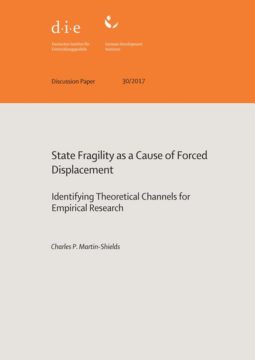Our understanding of how state fragility leads to forced displacement remains empirically and theoretically fractured, even as wider research on development and migration has expanded. Forced displacement and mixed migration will increasingly be central to global debates in the coming decades, particularly in fragile and weak states; thus the goal of this Discussion Paper is to provide a theoretical structure for future research on forced displacement and state fragility. To do this, we have developed a theoretical conceptualisation of how state fragility can lead to forced displacement, drawing on a multi-dimensional method for understanding state fragility. When a state is fragile, lacking in administrative, social and security capacity, the population is more likely to be forced to seek safety and economic opportunity elsewhere. One of the main challenges is bringing different fields into a cohesive conversation; issues that will be addressed include what different disciplines aim to measure, potential epistemological problems with assuming a linear relationship between development policy and forced displacement, and normative differences between fields. The outcome is an integrated theoretical analysis of the economic, political, and social drivers of forced displacement in fragile states, focusing on the theoretical causal channels wherein state fragility leads to forced displacement. This can inform new empirical approaches for measuring and analysing the relationship between state fragility and forced displacement, while speaking to practical issues faced by regional and international organisations working in fragile states on forced displacement and migration issues.
- Veröffentlicht am Samstag 14. Dezember 2024 von Deutsches Institut f. Entwicklungspolitik
- ISBN: 9783960210559
- 30 Seiten
- Genre: Gesellschaft, Politik, Sachbücher, Wirtschaft
